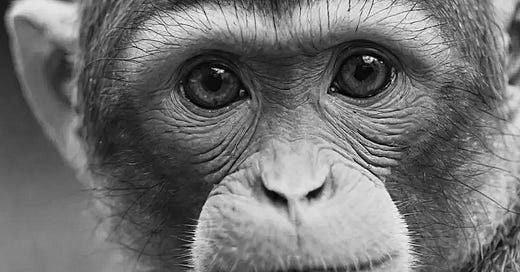The air was sterile, the odor of disinfectant mingling with the antiseptic aroma of fear. Something didn’t smell right. In the stark, white cages, they huddled, the little ones. Some clung desperately to the cold, wire mother, clutching naked metal and finding a rubber nipple to feed. Knowing nothing else in the world. Others gravitated towards the soft, terry cloth figure, seeking comfort in its warmth despite the lack of nourishment it offered.
Where are the apples?
There were no sweet fruits or seeds, not even trees, and there were no birds or buzzing insects, streams, or soothing warm rains— only the pristine white lab coats on hangars, dry-cleaned and stiffened with starch. Back then, we all watched with curious eyes, meticulously noting bodily interactions, the howls, and the clinging. Data was the currency, each whimper, each touch, parsed and analyzed. Contrasting behaviors were noted. Love, he called it, this primal need for connection he sought to quantify. Without it, we do not feel safe enough to explore and grow. We are lost.
Days morphed into weeks, observations yielding results. The "wire" babies, deprived of the cloth mother's comfort, showed fragmented patterns; stunted growth, withdrawn personalities, a chilling indifference. The findings painted a stark picture —a basic need for comforting affection, a breakthrough echoing in the sterile halls.
But when the harsh fluorescent lights dimmed and the little ones slept, shadows often danced on the white walls. In my dreams, the cages transformed into endless mountains, rain forests, or scrub-grass. Clutching the cold metal for the food, not the plush mamma. Hunger gnawed, an emptiness that hummed with the hollow echo of their terrified whimpers.
What happened to the mothers? Where are they? And our friends?
The experiments finally ended, and the theories were validated. Papers published, awards bestowed. Flickers of doubt lingered. Curious eyes held a knowing glint, a shared understanding beyond the sterile clipboards and raw data.
Years passed. The citations and gold medals gathered dust. One late night, the researchers were reviewing old footage of the experiments, and I caught a glimpse. One of them was eating an apple. Then, a young monkey’s eyes engaged directly into the camera, sheer terror looking back into my soul. A primal voice echoed in the empty room.
A cold sweat prickled my skin. The room seemed to shrink, the sterile walls morphing into the familiar bars of my dreams. The researchers had evaporated like ghosts, leaving only a silent scream echoing through the decades, a chilling reminder of the cost of knowledge. Few protested.
I stared at my reflection in the polished steel of the cage next to mine.
***
I would love to hear your thoughts on this piece and/or the topics alluded to in the story!
Films of Harlow discussing his experiments
In an unfinished autobiography, Harlow recollected that his mother was cold to him, and he experienced bouts of depression throughout his life. We might view his work as a projection of his own unaddressed attachment issues.
You might also like to read my own story connected to this issue: My Mother’s Ghosts - A Memoir





Harlow's research has been a staple of introductory psychology courses around the world, but the ethical issues involved don't seem to have received the same kind of attention as, perhaps, Zimbardo's work.
Torture programs all over the world and through history include studies of fear like this being done on people even. It is chilling to say the least. The twin torture experiments of the Nazis come to mind. Very stark reminder of the costs.